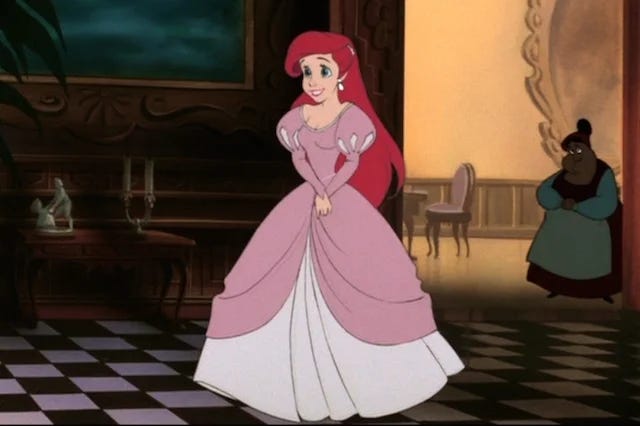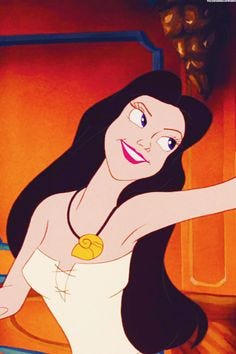“and I fortunately know a little magic
it’s a talent that I always have possessed
and dear, lately, please don’t laugh, I use it on behalf
of the miserable and lonely and depressed (pathetic!) -Ursula, “Poor Unfortunate Souls”
When I was an undergrad I produced a semi-regular zine called Thinking About Mermaids Again, and a year or so after I left Iowa City I went on to grad school to do basically only that for two consecutive summers, plus the painstaking year it took to get the script for that musical thesis I mentioned in worthy enough shape for my advisor, Todd Ristau. Back when Ian and I first got together, we ended up in conversation with (it’s horrible that in the ensuing years I can’t remember the exact world-region but) someone from one of those many countries that take Hans Christian Andersen very seriously. Ian’s wide-ranging in-depth knowledge rarely overlaps with anything I’ve ever researched or learned about, which keeps conversation continually exciting but also meant he had not had the opportunity, that early on, to hear me when I’m talking at length about something I already know, I mean actually know. At the end of that night, he said, “I’ve never seen you lit up with that kind of passion before!”
Ten years on, it’s less of a novelty, but the point is, I know my Andersen, because a generous group of my father’s friends made sure I could afford to keep studying after college. In addition to learning about Andersen’s lifelong issues with his own appearance (“The Ugy Duckling” was essentially wish fulfillment), his frought bisexuality, his, according to Charles Dickens, general insufferability, and his strange seeming-obsession with mangling female characters’ feet, I also studied the Disney version from every concievable feminist and anti-colonialist angle, a generative and rich endeavor for an unduring film that is neither romotely feminist nor at all anti-colonialist. Where that version’s scholarship got most interesting, though, was when great minds turned the queer/camp lens on Ursula.
Ariel’s eye-popping shells and nearly-nonexistent waistline might look like the female “ideal,” but, as befits a culture that loves to objectify women but is terrified of anyone actually enjoying sex, Disney animators give no indication that Ariel enjoys her body. Ursula, on the other hand, revels in the curves, ripples, and girth that combine elements of no-holds-barred hedonism with a broad but palpable nod to fertility goddesshood. Phallic tentacles + earthsking breasts in an unmistakably vaginal cave = birth, more or less. And no matter her ulterior motives of world-domination that inform her decisions to try to convince Ariel that going voiceless is no big deal, she sounds convincing, like she’s speaking from her true understanding of how this whole mating thing works for humans, when she says, “You have your looks, your pretty face. And never underestimate the power of the body language.” Italics can’t convey the shameless and sensual tsunami that Ursula stokes when she explicitly incites the act of seduction.
I could go on about the loss of voice as castration and any number of other dubious but arguable acedemic topics, but for now I want to focus on the contrast between Ursula’s fearless, pointedly sexual, and meant-to-be grotesque sexuality and the virginal draw of Ariel, who, despite being drawn as a no-holds-barred sexual object with a nymphomanic’s red hair, is ultimately demure and classically girlish in all boudoir-related matters. The first time she dines with the prince, she stands in silence wearing this:
Look at this dress long enough, and how could you not long for Ursula’s slick wet deep violet and black? Ursula wouldn’t be caught dead with those pleading eyes, because she doesn’t give a fuck what you think. It’s no wonder she doesn’t believe Ariel capable of actually seducing the prince in three days. Does this chick look like she’s ready for anything?
But seduce him she does, because he ain’t got no standards, not really, or perhaps because no one can listen to “Kiss the Girl” without doing as the song commands, but either way, her eel-mignons Flatsom and Jestsom are swiftly dispatched to topple the boat, instantly seperating the would-be lovers. (My cousins and I used to measure the exact distance that Ariel and Prince Eric [ugh, that’s how boring he is, his name is ERIC!]) ultimately got to each other before their kiss was thwarted). If Ariel succeeds in her part of the bargain, Ursula can’t capture her for ransom and use her as a pawn in her plan to take over Triton’s kingdom, and we can’t have that.
“She’s better than I thought,” Ursula laments. “The little TRAMP!”
This is a hilarious insult in context, given that Ariel is so aggressively virginal she practically leaves white rose petals in her wake. To solidify her victory over King Triton’s infatuated daughter, she morphs into Vanessa, a dark-haired vixen whose looks are tertiary to her real trump card, Ariel’s voice, trapped in a shell around her neck. (And if you want to read about Vanessa as Ariel’s Jungian shadow, hit me up, I’ve got a twenty-page paper for you!)

I thought I was going to go on a whole big thing about percieved imperfection and related matters to keep this post on theme, but I’ve decided I would rather watch Queen Latifah do “Poor Unfortunate Souls” in the role she was born for, and so should you.




